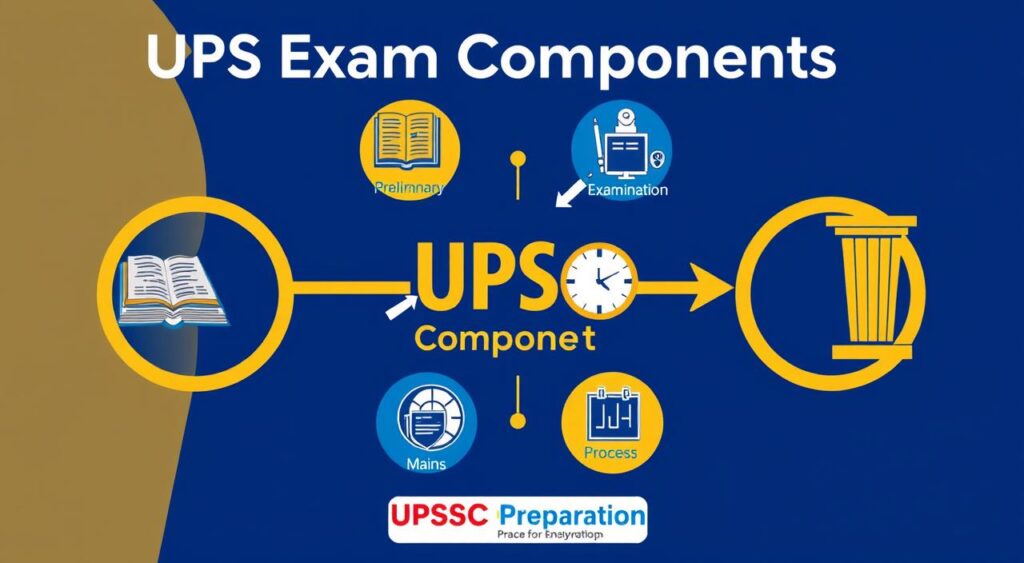Did you know that every year over 10 million candidates compete for a few thousand civil service jobs in India? It’s very competitive. To succeed, one needs to steer clear from the mistakes that might disrupt your endeavour. In 2025, it will be vital to know and avoid these 10 blunders.
And as someone who aspires to become a civil servant, I have witnessed the failure of even the most earnest students. They could fail to make effective use of time or lose track of critical study resources. These errors might take you a toll and impact your chances of doing away with this civil services examination. Along with providing you with the UPSC preparation strategy for 2025, in this guide, I will give you the dos and don’ts that you must follow to do well in 2025 UPSC.
Understanding the UPSC Examination Framework
Want to be a civil servant? You should have a good knowledge of the UPSC exam. It is the first step to being part of the Indian Administrative Service (IAS) and other premier services of the government. Let’s discuss what this exam consists of.
Components of the Civil Services Exam
The Examination is divided into three parts:
- Preliminary Exam (or UPSC CSE Prelims)
- Main Exam (also known as the UPSC CSE Mains)
- Interview (it is also referred as UPSC CSE Interview or UPSC CSE Personality Test)
Significance of Each Stage
Preliminary Exam: Assess your basic knowledge. You are tested on your depth of knowledge and writing ability in the Main Exam. Interview stage — focus on your personality and communication.
Latest Pattern Changes for 2025
New Rules For UPSC Exam For 2025 There is a new section on current events in the Preliminary Exam. Main Exam will be majorly on essay securing and way you mention the answer. Get the latest knowledge to refine your civil services preparation strategy and UPSC exam tips.

“The key to success in the UPSC exam lies in understanding its framework and adapting your preparation.”
10 Common Mistakes Beginners Make During UPSC Preparation in 2025
All of us start our UPSC journey with lots of hope and ambition. However, UPSC test is hard, and we must be cautious to avoid most common errors. Here, we will discuss ten common mistakes beginner make in 2025. With this guide, you will be able to avoid these pitfalls and elevate your success rate.
- Ignoring the Exam Framework: A lot of beginners are not clear about what the UPSC exam structure is. RESULT: A Very Bad Study Plan
- Poor Time Management: Novices have difficulty in maintaining an adequate balance between subjects and study routine.
- Neglecting NCERT Books and Foundational Material: Underestimating NCERT books and preliminary reading material is a major blunder.
- Selection of Optional Subject: There was a lot to think about and a way too much in which people go wrong after all the hard work, but this optional subject was a major aspect they got carried away with.
- No Reading of Current Affairs and Newspaper: Not keeping up with current events and analysing them is often missed.
Those are only a couple of the errors that newbies make in 2025. The next couple of articles we will explore each issue in detail. We will share some tips to help you steer clear of these mistakes and ensure you make it through the UPSC exam.
This is a long race, not a short sprint, especially in the case of the UPSC exam. Following these pitfalls and a way of a smart solution, you can prepare for the success in the 2025 UPSC exam.
Ineffective Time Management Strategies
For UPSC aspirants, time management is of utmost importance. Many mistakes that novices commit often undermine their chances. We’ll explore some mistakes people make and how to prevent them.
Creating well-balanced study timetable
The first step is to create a solid study plan. However, managing all the subjects is like rocket science. Underperform if you do not cover critical topics
Prioritizing Important Topics
The UPSC syllabus is huge. You can easily get lost in less important things. Dissect the important aspects that need to be done correctly.
Managing Multiple Subjects
UPSC plays many responsibilities on you. That’s a lot to keep up with. You can do well even by not ignoring any subject.
Effective Time Management Strategies
- Creating a balanced and comprehensive study schedule
- Prioritizing high-value topics and subjects
- Effective multitasking and subject management
- Utilizing time-saving techniques like pomodoro and batching
- Regularly reviewing and adjusting the study plan
Ineffective Time Management Strategies
- Neglecting crucial topics or subjects
- Overemphasizing certain subjects at the expense of others
- Lack of a structured study schedule
- Procrastination and poor time allocation
- Inability to adapt the study plan to changing needs
If you prevent these time management mistakes, you can plan ahead. This will help you succeed in the UPSC exam.
Neglecting NCERT Books and Foundation Material
The foundation material and NCERT books are ignored by most of the UPSC aspirants in the very beginning. This is essential for good to study for the UPSC. However, many students do not see their value.
In Indian schools NCERT books are used. They are covering many subjects need and vital for UPSC. These books teach you the fundamentals soundly.
These books are easy to read. They assist you in better understanding the topics. They are essential to prepare well for the UPSC, and skipping on them can bring difficulties.
- NCERT books forms the basic foundation of preparation for UPSC
- They encompass extensive topics directly related to the UPSC syllabus
- Aimed towards students in terms of language and subject matter
- Not referring to NCERT books would leave gaps in your knowledge which would impact your UPSC preparation
NCERT books and foundation material plays an essential role in the life of UPSC aspirants. Having these in your study plan gives a fair understanding of your topics. This increases your failure rate in UPSC exam. Keep in mind that the base you will learn is very important, and NCERT books constitute most of it.
“The foundation of any strong UPSC preparation is built upon a deep understanding of NCERT books and foundation material.”
Poor Optional Subject Selection Process
Choosing an optional subject is a dilemma for UPSC aspirants. This will indeed highly influence their score in civil services exam. A lot of beginners slip up here, which can throw your plan desk and exam tips all over the place.
Factors to Consider When Choosing Optional
Think about your previous studies, your preferences, and your recent scores when choosing an extra subject. Choosing a subject you are passionate about makes your study experience more enjoyable and will surely improve your performance.
Common Optional Subject Myths
- MYTH: You can score easier in some optional subjects than others.
- Myth: The best subjects are the most popular subjects.
- Myth: Selecting a less common subject guarantees higher marks.
These myths can cause people to make poor decisions. It’s important to think carefully and know what you’re doing when picking your optional subject.
Analysis of Scoring Patterns
| Optional Subject | Average Marks (out of 500) | Rank Distribution |
|---|---|---|
| Public Administration | 320 | Top 30% |
| Geography | 350 | Top 20% |
| Sociology | 370 | Top 15% |
| Political Science | 330 | Top 25% |
Reviewing scores and ranks allows you to make wise choices. Like this, you choose a subject which also goes well along with your skills and trends of the exam.
Choosing the appropriate optional subject is the first step towards mastering success. Knowing what to look for, what myths to avoid and how to check the scores can help you make a smart choice. It enhances your prospects in the civil services examination.
Completely Ignoring Current Affairs and Newspaper Reading
UPSC aspirants should always be in the know when it comes to news. Failing to do so can penalize your test score. It is essential for UPSC because reading newspapers exposes you to a wide variety of topics.
UPSC aspirants often don’t see the value in current affairs and newspapers. They might just study books, missing out on important insights and skills. These are gained by keeping up with national and global news.
Hence reading good newspapers is essential for performing well in the UPSC exam. It has kept you informed and helped you make sense of complicated things. This applies to written exams and interviews alike.
Best Practices for Current Affairs and Newspaper Reading
- Daily newspaper reading The newspapers Take a time each day to read the newspaper.
- Don’t just memorize the news, understand the news.
- Maintaining a log of crucial news and its significance.
- Read different media outlets to get the whole picture.
- Participate in discussions with others to refine your own thinking and speaking.
- Join discussions with others to improve your thinking and speaking.
| Newspaper | Advantages | Disadvantages |
|---|---|---|
| The Hindu | Comprehensive coverage of national and international news, in-depth analysis | Relatively more lengthy and detailed articles |
| The Indian Express | Crisp and concise coverage, emphasis on current affairs | May lack the depth of analysis compared to other newspapers |
| The Times of India | Wide range of topics, including sports, entertainment, and lifestyle | Relatively less focused on in-depth analysis of current affairs |
And, to sail through the scroll of news and current affairs, here are some smart strategies to make themselves distinct as UPSC candidates. Not paying attention to this can truly hurt your prep and thus your score.
Insufficient Answer Writing Practice
One important aspect that most aspiring UPSC candidates ignore is answer writing skills. The preparation in the civil services exams is not only about mugging, however. You want to communicate your ideas effectively and powerfully.
Developing Writing Skills
For UPSC preparation, One must take his writing skills to the next level. Practice answering sample questions regularly. Emphasize structure, clarity and how well your thoughts connect to each other.
Find out what examiners expect from your answers. You are going to have to modify your responses accordingly because they need your responses.
Understanding Examiner’s Expectations
UPSC examiners look for few things in your answer. They expect analytical thinking, a good subject knowledge and strong arguments. Your time management plan for UPSC aspirants should be aware of what they expect.
Time Management in Exams
- Even use mock tests and timed exercises to work out how to balance your time.
- How do you best plan your time on the exam?
- Learn to share your ideas quickly and within the word limit.
This Task of becoming good at answer writing is a major task in your UPSC prep. Writing: Improve your writing, know what examiners are looking for, build your time management – UPSC aspirants Read More: These Tips Will Help You Excel in this Difficult Exam.
“The key to success in the UPSC exam is not just about memorizing facts, but about the ability to present your knowledge in a clear, concise, and persuasive manner.”
Social Media and Digital Distractions
Social media and online sites have become ubiquitous in today’s age. It distracts us a lot from our UPSC preparation. Such distractions can ruin your study schedule and delay your learning process. It is important to find ways to beat procrastination and manage distractions when you’re working towards something like being a civil servant.
Biggest challenge for UPSC students is social media. It can consume a lot of study time — the endless scrolling and the fear of missing out. Skip or reduce your time on social media, or take a break entirely, as you study.
Fun on the internet, such as viewing videos and playing games, can be enticing. That said we have to balance it out. Make sure these breaks don’t get in the way of your studies. Set aside specific times for fun and stick to it.
- Eliminate and stop wasting time on some things like over browsing and checking emails all day.
- Downloading apps or browser tools that limit certain sites that distract you while studying.
- Create a quiet study zone where there are no distractions.
- Break more often than usual to rest and clear your mind.
So long as you’re mindful of your online behaviour and actively try to cut out unnecessary distractions, you’re on the right track. You can defeat procrastination and achieve your UPSC goals. You have trained up-to oct 2023.
“The ability to focus is a superpower. In our distracted world, it’s becoming a rare skill.”
Neglecting Physical and Mental Well-being
During the preparation of UPSC, we often neglect our health. This can lead to burnout. Baath, its very very important to upkeep the self in UPSC journey.
Stress Management Techniques
It is a very high-stress test, the UPSC exam. Keeping us focused with stress management Techniques such as meditation and yoga can maintain us tranquil.
The importance of exercising on a regular basis
Be active when you prepare for the UPSC exam. It increases our energy and cognition. Even a small amount of weekly exercise can have a big impact.
Maintaining Work-Life Balance
Managing studies with personal life can be difficult. But creating boundaries and taking breaks does change things. In this way we can live our life apart from the study.
Our own health is equally important for success in the UPSC. Taking care of ourselves means we also will not burn out and perform better in our studies.
Stress Management Techniques
- Meditation
- Mindfulness practices
- Relaxation exercises (yoga, deep breathing)
Benefits of Regular Exercise
- Increased energy levels
- Improved cognitive function
- Enhanced overall well-being
Work-Life Balance Strategies
- Set clear boundaries and schedules
- Prioritize self-care activities
- Take periodic breaks and vacations
“The secret of getting ahead is getting started. The secret of getting started is breaking your complex overwhelming tasks into small manageable tasks, and then starting on the first one.”
– Mark Twain
Following Multiple Sources Without Strategy
While preparing for UPSC exam, it is very tempting to follow a lot of study sources. But this can confuse you rather than help. A clear plan is the key to good UPSC study techniques.
Much of what you hear from those who pass the UPSC is that it’s important to restrict yourself to a few trusted sources. However, do not learn from everything. The best materials is to do proper study on a few good materials to make your prep better and focused.
- Identify good study agents such as NCERT books and online sites.
- Debate through each subject in your study plan
- Master the big ideas.
- To be able to remember what you learn, make sure you keep going back to it and reviewing it.
Finding that balance in your study is key. Don’t try to learn too much at once. Stick to a few good sources and a solid plan. This will help you do your best on the UPSC exam.
“Focusing on a few reliable sources and developing a structured study plan is the key to UPSC success.”
Advantages of Focused Study Resources
- Deeper understanding of core concepts
- Efficient time management
- Ability to identify and address knowledge gaps
- Consistent and targeted preparation
Disadvantages of Scattered Study Sources
- Information overload and confusion
- Lack of focus and direction
- Difficulty in consolidating learnings
- Inefficient use of time and resources
The UPSC exam checks your knowledge better but also what you know and how you apply it. Studying smartly helps you in succeeding and feeling confident during your UPSC preparation.
Lack of Proper Guidance and Mentorship
So, you get to begin your journey as a civil servant. That alone is a very big mistake newbies are making. They’re not getting the support they need.
Also, this is a blunder that can seriously damage your prospects of doing well. It makes staying on track and motivated very challenging.
The UPSC exam is very hard. It assesses you in quite a few areas. It also tests your time management and your work planning skills.
UPSC preparation: Staying motivated is the key Providing an effective strategy for UPSC preparation can be a game-changer. Experienced mentors can help a lot.
Mentors are well versed in the exam. They can recommend good study resources. They also help you, not make mistakes.
They provide feedback on writing answers and preparing for interviews. This prepares you for the questions on the exam.
“A good mentor can be the difference between success and failure in the UPSC examination. Their guidance and support can be invaluable during the most challenging phases of preparation.”
Mentors aren’t only teachers. They hold you to a standard and maintain your focus. They give you moral support when you need it most.
You can improve by learning from experts. You will have a greater chance of accomplishing your goals.
So in short, not getting the right help is a huge mistake. With the assistance of mentors you can face the exam with more confidence. This will help you succeed in 2025 and beyond.
Conclusion
We have done a round up on 10 common mistakes of beginners of UPSC prep for 2025. Avoiding them is crucial to doing well on this challenging test. Mistakes such as poor time management and venturing into new territory without checking out the latest news can slow you down.
A good knowledge of the UPSC examination and a strong focus on fundamental ideas are crucial. Other important things are mastering the writing skills and keeping balance between work and life. Good advice and even organizing your study materials can go a long way as well.
And that is reason enough for this preparation, the UPSC Civil Services Exam is a marathon, not a sprint. Don’t keep repeating these mistakes and with clearance of which, you can have a great prep in 2025. Be resolute and focused, and have a sound knowledge of the exam. You are training with new dependencies, so make sure you are in a big company.
FAQ
What are the most common mistakes beginners make during UPSC preparation in 2025?
To do well in UPSC, avoid big mistakes. Don’t waste time or ignore important books. Pick the right optional subject and keep up with current events.
Practice writing answers and take care of your health. These steps are key to success.
How can I effectively manage my time during UPSC preparation?
Managing time well is key. Make a study plan and focus on important topics. Learn to avoid procrastination and stay focused.
Why are NCERT books and foundation material so important for UPSC preparation?
NCERT books and foundation material are essential. They teach the basics needed for the exam. Don’t skip them to avoid gaps in your knowledge.
How do I choose the right optional subject for the UPSC exam?
Choosing the right optional subject is important. Think about your background, interests, and how well you can score. Don’t believe myths and get advice from mentors.
How can I stay up-to-date with current affairs and newspaper reading during UPSC preparation?
Keeping up with current events is crucial. Set aside time each day to read newspapers. Use strategies to organize important information and fit it into your study plan.
What are some effective techniques for improving my answer writing skills for the UPSC exam?
Good answer writing skills are vital. Work on your writing style and understand what examiners want. Practice managing your time and get feedback to improve.
How can I manage social media and digital distractions during UPSC preparation?
Social media and distractions can hinder your progress. Set boundaries, use tools, and take breaks. Stay disciplined and focused to overcome these challenges.
Why is it important to focus on my physical and mental health during UPSC preparation?
Your health is crucial for UPSC success. Use stress management, exercise, and balance work and life. This keeps you motivated and ready to do your best.
How can I effectively use multiple study sources without getting overwhelmed?
Using many study sources is good, but plan carefully. Choose and prioritize your materials. Focus on quality and use a structured approach to make the most of your resources.
Why is it important to seek proper guidance and mentorship during UPSC preparation?
Guidance from experts is very helpful. Mentors offer insights, help avoid mistakes, and keep you motivated. A support network and learning from others can greatly improve your chances of success.









1 thought on “UPSC Preparation: 10 Common Mistakes to Avoid in 2025”